
https://www.youtube.com/watch?v=KsC3E9Tpd1k&t=308s
UnBEETable Facts - How beetles can help farmers profitability and ecosystem sustainability!
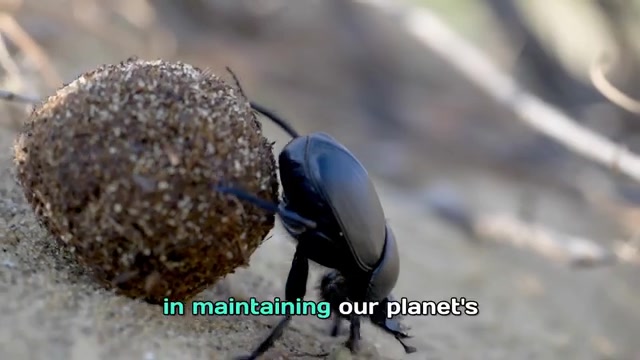
Hey there .
Welcome back to our channel .
Today , we are diving deep into a world that often gets overlooked .
The world of beetles .
That's right .
These little guys may seem small but they pack a punch when it comes to their importance in the grand scheme of things .
From their incredible life cycles to their crucial role in maintaining our planet's ecological balance .
We will explore why these little critters matter more than you might think , but that's not all .
We will also reveal how beetles can be a farmer's best friend , helping them save money and improve crop yields .
Did you know that the Ancient Egyptians considered Beatles sacred ?
Yeah , they revered the scare of beetle associating it with rebirth and regeneration .
The dung beetle was believed to be an incarnation of the early morning .
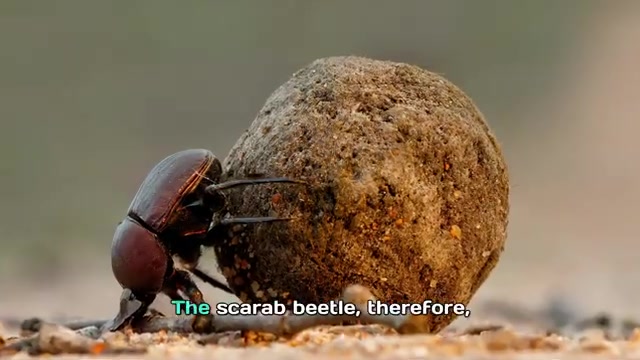
So God Keri , who was responsible for rolling the disc of the morning sun over the eastern horizon at daybreak , the behavior of the dung beetle which rolls dung balls and disappears them underground was seen as a representation of the sun emerging and vanishing every day .
The Ancient Egyptians believed that the Beatles dung ball was representative of the world and the Beatles actions kept the world forever revolving like its ball of manure .
The scare of beetle therefore became a symbol of the eternal cycle of life and was often used in funerary contexts to provide protection in the afterlife .
This made the beetle a favorite form used for amulets in all periods of Egyptian history .
So the next time you spot a beetle , remember you're in the presence of an ancient mystical creature .
Now let's take a look at why these little guys are so important .
Did you know that every day the animal kingdom produces enough dung to match the volume of water pouring from the Victoria Falls ?
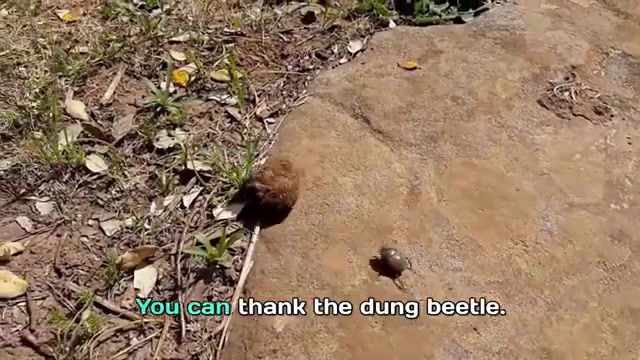
So why isn't the planet covered in this stuff ?
You can thank the dung beetle .
Well , these little fellas play a huge role in our ecosystems .
They are the ultimate recyclers .
They burrow into the soil , improving its structure and aeration .
So in a way , they're like earth's natural rototillers always working hard behind the scenes .
Here is something incredible .
I bet you didn't know dung beetles are capable of burying 250 times their body weight in a single night .
Over 7000 known species of dung beetles run cleanup duty across six continents every day .
And this is only about dung beetles .
In fact , there are over 350,000 species of beetles worldwide , also very involved in recycling our planet's dead waste .
That's more than all the species of mammals , birds and reptiles combined .
It's like the Oscars .

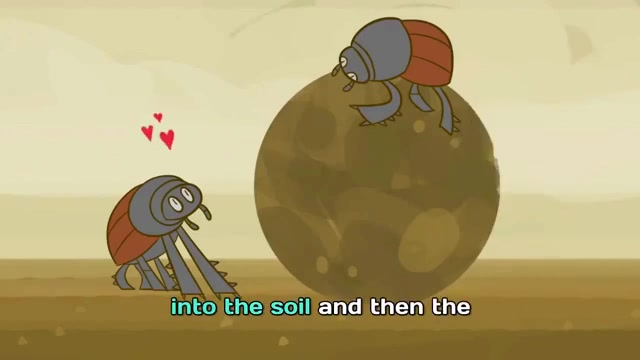
But for bugs , a pile of elephant dung can attract over 4000 beetles in 15 minutes .
Most dung beetles fall into one of three main groups .
Rollers , tunneler and dwellers , dung rollers sculpt a ball of dung and quickly roll it away from competitors using their back legs .
Potential partners jump on the ball and when the mate is selected , the couple dig their dung ball into the soil and then the female moves a single egg into the ball tunneler are a type of dung beetle that doesn't mind the effort of rolling dung away .
Instead , they dig down into the dung , creating tunnels to bury pieces of it .
Male tunneler have an array of horns that they use to fight each other for control of these tunnels .
They protect the tunnel until the female lays an egg .
Some tunneler have evolved to be very smart .
They disguise themselves as hornless females and sneak into the tunnels to mate while the guardians are busy fighting each other .
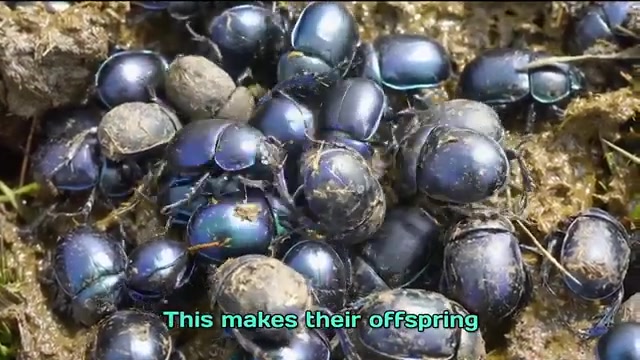
Dwellers are the laziest of the dung beetles .
They are happy to just live in the dung itself and there they lay their eggs .
This makes their offspring more vulnerable to predators .
Once the larvae hatch , it consumes the dung , then it metamorphoses into a pupa and finally an adult beetle .
So let's take a detailed look at how dung beetles are important for the ecosystem .
Number one nutrient cycling dung beetles help break down and recycle dung , enabling the nutrients in the dung to cycle through the soil .
This process is crucial for maintaining healthy soils and plants as they need nutrients to thrive .
100 cows will produce 1800 kg of dung .
Now , that is a massive amount of dung .
So there's a couple of things that can happen with that .
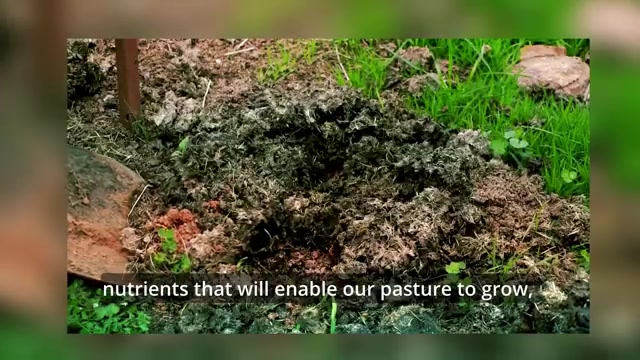
It can either be processed by dung beetles and be a real benefit to our soil or it can be washed into our waterways where it's a real nuisance that dung has got fantastic uh nutrients in it .
It's got nitrogen , it's got phosphorus , it's got potassium .
They are all important uh nutrients that will enable our pasture to grow and by burying that dung .
The beetles also provide a food source for earth worms .
Number two , supporting food production in agricultural ecosystems .
Dung beetles play a vital role in supporting the production of food .
They help keep farm animals like sheep , cows and horses healthier by burying their dung which reduces the availability of breeding sites for flies that can disturb the animals .


Number three , increased pasture yields , dung beetles contribute to increased pasture yields by incorporating organic matter into the soil , improving soil friability , aeration and water holding capacity .
This in turn benefits the growth of plants and the overall productivity of the pasture ecosystem .
Number four , pest control by reducing the populations of insect pests that breed in animal feces .
Dung beetles help prevent pasture surface pollution and the spread of diseases .
Number five air pollution reduction .
Some dung beetles have been found to reduce the methane emitted by cow dung by up to 40% contributing to the reduction of air pollution .
So dung beetles can serve as indicators of ecosystem health .
If certain dung beetle species disappear from a particular ecosystem , it may suggest that there are underlying issues with the health of that ecosystem such as the decline of forest mammals .

They also serve as secondary seed disperses that are present in the dung by burying them .
They are also protecting the seeds from predators .
Even plants know how beetles are important .
One particular South African plant , Serato Carum Argentine has evolved to produce seeds that look like dung to trick beetles and make them bury their seeds .
Now , here is another astonishing fact .
The incredible free services of the dung beetles have been valued at $380 million a year in the US and £367 million a year in the UK .
Wow .
Isn't this awesome ?
So how can farmers encourage ground beetle populations on their land ?
Well , it is simple .
There are some best practices they can implement .
One is to minimize tillage .

Ground beetles are negatively affected by intensive soil tillage which can lead to a decline in their numbers , adopting reduced tillage or no till practices can help maintain a healthy population of ground beetles contributing to soil conservation efforts .
Another thing is inter cropping and unders sowing , planting multiple crops in close proximity or sowing , cover crops between main crops can provide a diverse habitat and food sources for ground beetles .
This can help support their populations and enhance their beneficial effects on soil conservation and pest control .
Farmers can also maintain uncultivated or less cultivated areas on the farms such as grass margins and field borders that can provide suitable habitat for ground beetles .
These areas can support high insect pest prey densities provide a favorable microclimate and offer protection from predators .

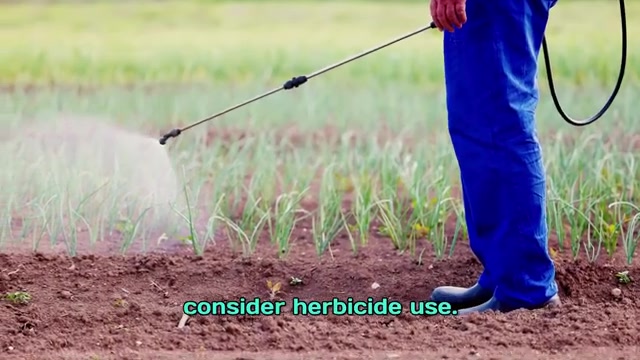
Once ground beetles are sensitive to disturbance events such as pesticide applications and burning , minimizing these events when possible can help maintain a healthy population of ground beetles on the farm .
Finally consider herbicide use .
Some herbicides can reduce ground beetle abundance and community assemblage through habitat modification .
When using herbicides , it is important to consider their potential impact on ground beetles and choose products and application methods that minimize harm to these beneficial insects .
Some beetle species are on the brink of extinction due to habitat destruction and pollution , we need to step up and protect these little guys because when a species disappears , it's like mother nature losing a puzzle piece .
Farmers play a key role to safeguard their survival .
So there you have it folks , the incredible often overlooked world of beetles from their life cycles to their ecological importance .
They truly are the unsung heroes of the natural world .

Thanks for joining us on this be terrific journey .
If you enjoyed this video .
Don't forget to , like , subscribe and share it with your fellow bug enthusiasts .
Are you looking for a way to reach a wider audience and get more views on your videos?
Our innovative video to text transcribing service can help you do just that.
We provide accurate transcriptions of your videos along with visual content that will help you attract new viewers and keep them engaged. Plus, our data analytics and ad campaign tools can help you monetize your content and maximize your revenue.
Let's partner up and take your video content to the next level!
Contact us today to learn more.